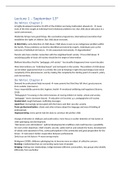Lecture 1 – September 13th
De Winter, Chapter 3
In highly developed countries 10-20% of the children are being maltreated, abused etc. cause
most of the time sought at individual level (relational problems etc). But child abuse take place in a
social environment…
Modernity brings many good things, like vaccination programmes, international convention that
establishes the rights of children. But child abuse increases.
At Risk Policy: early detection of child abuse. Child abuse is seen as an endogenous problem within
the family. These problems can best be identified and solved by experts. Individuals seen as the
outcome of individual risk factors. risk-assessment instruments stigmatisation?
Parents who have a better connection with the neighbourhood/ society less child abuse
socializing quality of local civil society should be the target of intervention
Blokland describes that the “pedagogic civil society” has steadily disappeared over recent decades
Most interventions are “individual-based” and not based on the society. The problem of child abuse
can be better approached than is currently the case by keeping in sight the psychological and social
complexity of the phenomenon, and by making this complexity the starting point of research, policy
and interventions.
De Winter, Chapter 4
Demand for professional help increased many parents feel that they fall short, great pressure
from outside (Hermanns)
Focus responsibility parents diet, hygiene, health emotional wellbeing and happiness (Stearns,
2010)
“Pedagogisch” focussing on the entire business of rearing children in family, school and society,
“pedagogic” more classroom-bound. educative civil society i.p.v. pedagogische civil society
Double bind: caught between conflicting messages
Liquid fear: increasingly preoccupied with the future and their security; anxiety
Proto-professionalization: clients and other citizens adopt the language and way of thinking of
professionals
Hyperparenting: every parent had the duty to construct the perfect child
Change of direction in childcare and youth policy: more focus on earlier detection of risk factors in
child-upbringing and development.
“Alle kansen voor alle kinderen” optimal developmental conditions and result become a possibility
for every child; objectives: child’s health, security, safety both in and outside the home, development
of talents and enjoyment of live, active participation in the community and good preparation for the
future. instrument: better cooperation between professionals
Only focus on risk factors many wrong results
Brinkgreve (2008): childrens upbringing has to become more an object of collective concern.
Bonding: relationships that are connecting (same type of people)
Bridging: Making new relationships, bridge between different communities, two groups who identify
differently from eachother
,Richard Lerner, youth policy that connects with the latter conceptions of citizenships, positive
development is a fruitful interaction between individual and context. Friendship migrant-NL
Moritsgu, chapter 1
Community psychology: about the relationships we have with those around us, and how those
relationships can help in times of trouble and can enhance our lives in so many other ways.
Understanding that our lives include what is around us, literally and figuratively. Provides direction in
how to build a better sense of community.
Goal community psychology: optimize the well-being of communiteis and individuals with innovative
and alternate interventions designed in collaboration with affected commynity members and with
other related disciplines inside and outside of psychology
Four Broad Principles Guiding Community Research and Action:
1. Community research and action requires explicit attention to and respect for diversity among
peoples and settings.
2. Human competencies and problems are best understood by viewing people within their social,
cultural, economic, geographic, and historical contexts
3. Community research and actions is an active collaboration among researchers, practitioners, and
community member that uses multiple methodologies. Such research and action must be
undertaken to serve those community members directly concerned, and should be guided by their
needs and preferences, as well as by their active participation.
4. Change strategies are needed at multiple levels to foster settings that promote competence and
well-being
Community psychology is born out of disstatisfaction with the limitations of the traditional
psychotherapy approaches.
Fundamental principles: the theoretical assumptions on which a concept is built, or the values that
influence and motivate action in the field.
Important frameworks Community Psychology:
, Our behaviors are governed by the expectations and demands of given situations.
Empowerment is basic concept of Community Psychology. Empowerment is a way in which
individuals and communities feel that they have some say in and control over the events in their
lives, the structures that shape their lives, and the policies that regulate those structures (versterken
van mensen).




